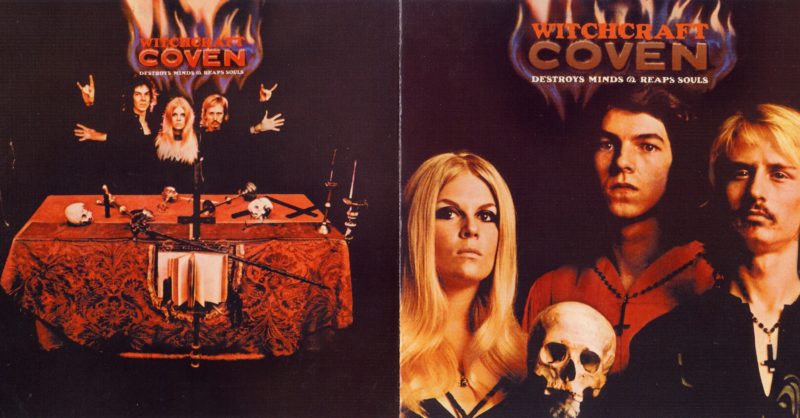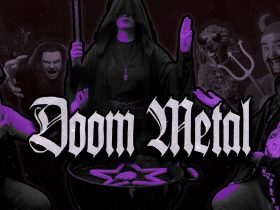(TheBRHM.com) Jess and the Ancient Ones, Jex Thoth and Lucifer are three of the bands that first come to mind when “occult rock” is brought up. It’s with good reason as those bands really deliver some great albums in that vein.
First of All: What Is Occult Rock?
I will say that it’s also that we’re in the middle of a revival for the quasi-genre. Occult rock is similar in phrasing to glam metal.
Like the 80s glam metal bands, today’s occult rock bands come from different genres—mostly progressive rock, doom metal, and heavy metal—but it’s the lyrical content that puts them under the “occult rock” label.
Looking at 80s glam, most of the bands involved were either heavy metal bands that weren’t the heaviest out or hard rock bands that were heavy metal adjacent.
In the case of occult rock, the lyrical content is more on darkness, systems of magic, horror tales, and old religions and ceremonies. Occult rock’s roots are in the late 1960s progressive rock and psychedelic rock movements.
During this time in music, you have a ton of rock bands that were heavily inspired by blues and folk music. The political climate of the time saw more left wing-leaning tunes about peace, love, life, and just getting along with each other.
In the background you had the slow wheels of the U.S government turning to make changes, riots because things weren’t moving fast enough, and war–there were still noticeable problems.
The summer of love was impacting society and the end of it would impact things further.
As with any period in music, you also have bands that adapt to the sounds being developed in that decade that aim to push it further. This push could come in the form of complexity, atmosphere, or lyrical content.
Like, sure, there were tons of anti-war folk songs and some early hard rock was on tap but what if someone made folk songs about witchcraft? Or progressive rock songs about dark rites? What if psychedelic rock could sound heavier throughout an album?
What if a band did something different? Something completely outside of the usual for the times. What if there was album that sounded like its contemporaries but ran in a completely different direction.

Coven – Witchcraft Destroys Minds and Reap Souls
Coven is a band near and dear to my heart. With only one notable full-length album to its name, it had a strong impact on today’s occult rock acts. While the lyrical approach is the same as it ever was, a major contribution of Coven came in the form of lead singer Jinx Dawson.
Women singing folk rock or psychedelic rock wasn’t an abnormality in 60s rock. As a matter of fact, good female vocalists have this power to their voice that can how a song sounds compared to if a male vocalist sang the same song.
To put an image in your head, imagine if Meat Loaf sang “Holding Out for a Hero” instead of fellow Jim Steinman collaborator Bonnie Tyler. Who knows, it might still be a great song or it could’ve been a B-side track that was missing something.
With Jinx Dawson, we had a female singer not only doing psychedelic rock but particularly dark psychedelic rock. This was very different for the scene and it was awesome. Also, it seemed pretty appropriate considering the violent, dangerous end of the Summer of Love with the Manson Family murders and the assassinations of JFK earlier in the decade and MLK Jr towards the end of it.
Coven’s debut a 46-minute listen featuring horror tales, dark history, witchcraft, and even part of a black mass as the band was at one time the house band for the original Church of Satan. It’s pretty much a late 1960s psychedelic outing. If the lyrics had been different and the black mass dropped, this would’ve been similar to other rock albums released during the 1960s.
The imagery and lyrics moved Coven outside of that box—although they would go in a more commercial approach with their 1970s releases.
Even in listening to Witchcraft Destroys Minds and Reap Souls over 50 years later, it holds up. You could see a modern band taking the same approach from music direction to production just to create a vibe or atmosphere for the listener.
While production is much slicker today—even for amateur producers with a barebones homemade studio—the aesthetic stuck around. It adds to the atmosphere of occult rock.
Mind you, the lyrics lack the power and elaborateness of today’s song writers. Witchcraft Destroys Minds and Reap Souls is an album that gets it done as a whole project.
Those lyrics might seem mediocre when pulled from the singing, production, and instrumentals but as a total package, this album is an entertaining listen. It’s groundbreaking without being the best example of the genre.
Normally for reviews I will rate the strength of the tracks on the A-side and B-side and give you the strongest songs on both. However, this album has some very good songs on both sides. It’s pretty consistent throughout, so here are the tracks to whet your palette.
Stand Out Tracks: White Witch of Rose Hall, Coven in Charing Cross, Dignitaries of Hell
Staff Writer; M. Swift
This talented writer is also a podcast host, and comic book fan who loves all things old school. One may also find him on Twitter at; metalswift.










Leave a Reply